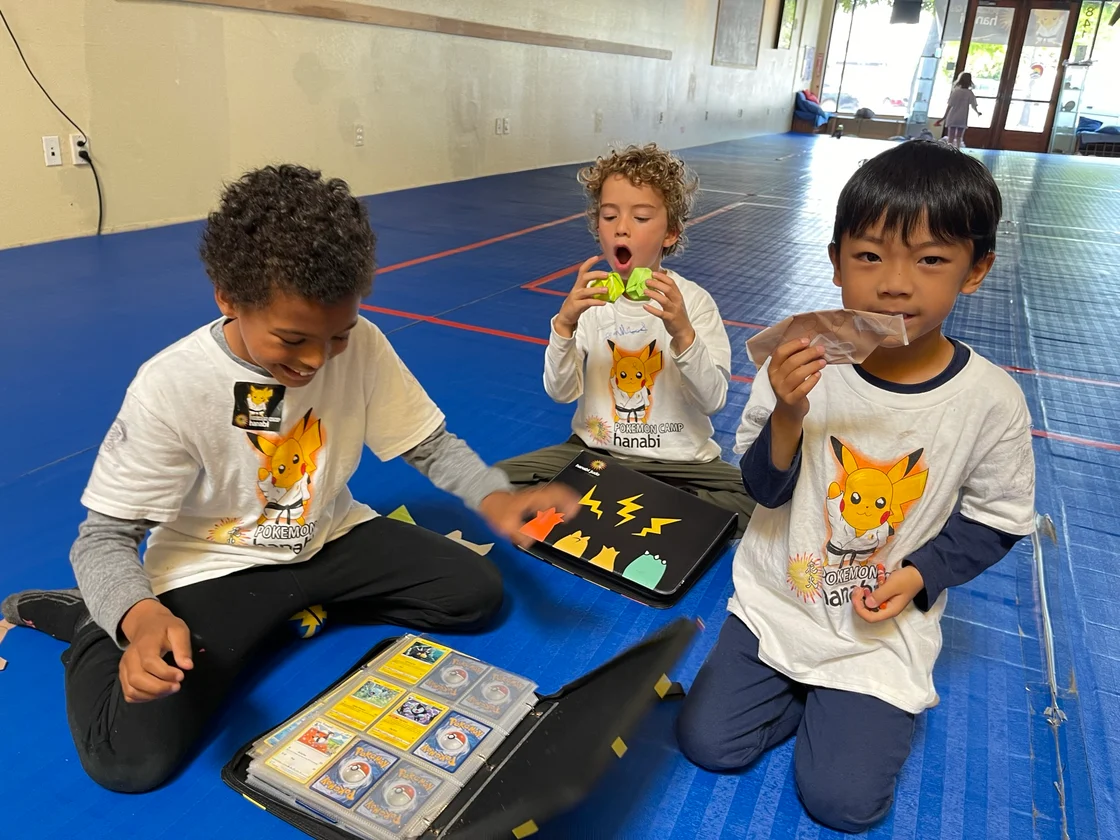

Hanabi Winter PokeCamp: Physical and Cultural Adventures!
“Hanabi Winter PokeCamp is an activity filled adventure that includes judo, Japanese language and culture, and lots of physical activity! Our campers go home sweaty and singing! Perfect for children from 5 to 15.
During every themed session children do fun and engaging activities: we do painting, drawing, origami, and even trade Pokémon cards! Complimentary Hanabi T-shirts are prepared for each child and each child gets to stamp the weekly theme onto their shirt, paint it, and get signatures from their new
camper friends. A great souvenir filled with great memories.
Hanabi Winter PokeCamp is brought to you by Hanabi Judo where learning is fun! Since 1965 Hanabi has offered a positive learning environment where respect comes as naturally as smiling.
Albany Camp Schedule
| Session | Theme | |
| 1 | Dec 30 – Jan 3 | Judo Week |
Schedule
8:00 Early Arrival
9:00 Camp Starts: Judo and Japanese Songs
10:00 Themed Activities
11:15 Outside Games at Park
12:00 Pick Up or Lunch
12:30 Watch Pokemon movies, Japanese stories and supervised play
1:15 Themed Activities Continued
2:30 Judo and Japanese games
3:00 Pickup
6:00 Late Departure
All Day Session: 9:00AM to 3:00PM; Early/Late Care: 8:00AM to 6:00PM
Prices:
All Day Session – $429 per child;
Early/Late Care: $135 per child. Includes participation in any judo classes going on before departure.
A $175 deposit is required to reserve space. Deposit is due at least one month prior to session. Balance is due 10 days before session start.
CAMP DIRECTOR, Dan Augustine, is a father of three and a former elementary teacher who holds a Master’s Degree in Education and a sixth degree black belt in judo. He has taught in New York, Tokyo and Berkeley. He speaks fluent Japanese.
REGISTER HERE:
ALBANY REGISTRATION
Frequently Asked Questions
Q: What does my child need to bring to camp?
A: We recommend a lunch or a snack, a water bottle, a backpack (with name in permanent marker), sunscreen, jacket or sweatshirt, and shoes good for running outside. Those staying in the afternoon should also bring a favorite book (though we do have a small library.) Do not bring money, expensive belongings or video games.
Q; What about lunch?
A: Children should bring a bag lunch.
Q: Is there care available before or after camp?
A: Early arrival begins at 8:00am and late departure is until 6:00pm. While we have a separate supervised area with games, puzzles and books, our regular judo classes start about 4:30 pm so children staying after camp are welcome to take part.
Q: Does my child need to know judo?
A: No. The judo we will be doing is basic, very safe, and appropriate for new students.
Q: Will my child need to have a judo uniform?
A: Not really. While having a judogi would be nice, most of the judo activities will not require a uniform.
Q: Are there any other costs for this program?
A: No. The materials for each session will be covered.
Q: Who are the staff?
A: Dan Augustine, Camp Director, is an educator with over 30 years teaching experience around the world.
Counselors are our Hanabi instructors, each of whom has years of experience working with children. Counselors in Training (CITs) – high schoolers hand-picked from over 250 Hanabi students – offer additional sup- port. All staff are wonderful young people and wonderful role-models.
Q: There will be a wide range of ages attending. Will the activities be appropriate for all?
A: The camp activities can be enjoyed by children of all ages. In addition, we have found that having older students learn, interact and help with younger students is fun and rewarding for both.
Q: What is judo? How is it different from other martial arts?
A: Judo was developed to be both an effective means of self-defense and a safe sport. Judo does not allow hitting, kicking nor other dangerous moves. Our students learn to fall safely, wrestle effectively and throw each other with control. Judo is the world’s second most popular sport (behind soccer) and has been an Olympic event since 1964. Judo is a required part of a child’s education in many French schools and most schools in Japan. Judo is more popular in Brazil than Brazilian jujitsu.
Q: I have thought about Martial Arts for my child because of the discipline. Will this program focus on discipline?
A: One of the basic foundations of Judo is respect and the development of character. We expect that all of our students, whether in our regular judo program or in our camp, will be respectful and kind to others. At Hanabi there is no conflict between having fun and being disciplined: we expect our students to follow rules and be respectful while they smile, laugh and have a great time.
Q: What does “Hanabi” mean?
A: Hanabi means “fireworks” in Japanese: literally “flower-fire”. We believe its brightness, energy and excitement truly expresses our spirit. Please find out more about us at www.hanabijudo.com.
The Hanabi Creed
Hanabi is a family; We respect Sensei as our leader, Sempai as our helper, and each other as friends. We believe in “Mutual Welfare and Benefit for All.*” We understand that judo, like life, is a challenge. We will fall down. We will hurt. But we also will get up and, through our persistence, working together, we will become stronger. We cannot always win but we can always learn and be better: better judo players and, more importantly, better people.
We are exciting, bright, full of light, color, life, energy and spirit We are the future. We are the present. We are Hanabi.
*“Mutual Welfare and Benefit for All” is the motto of judo. Judo players around the world commit to live by this philosophy.

